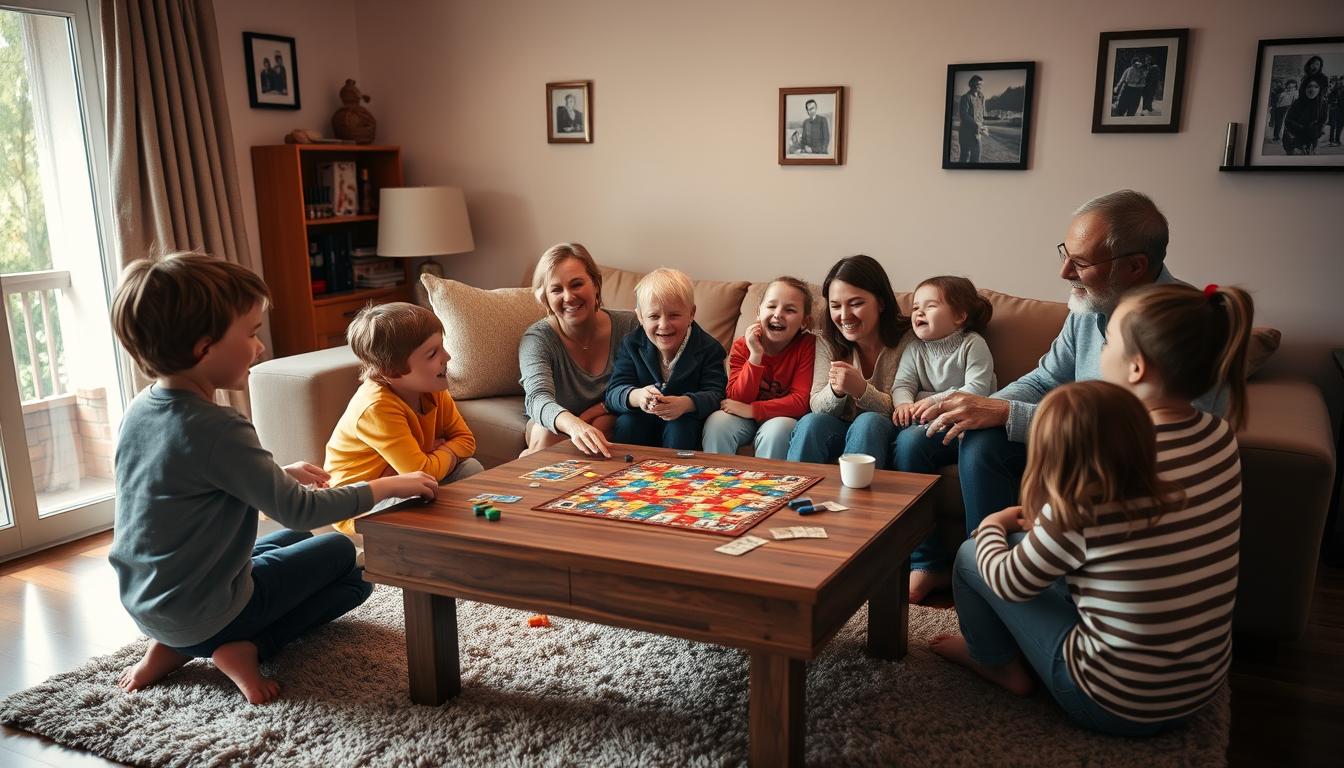Quality Time with Kids Matters
A recent study by the American Academy of Pediatrics found that 87% of children feel closer to their parents after spending quality time together. This shows how important family bonding is for kids’ growth and relationships with their parents.
In today’s busy world, finding time for meaningful moments with our kids can be tough. But, these moments are key for building strong family ties and helping kids grow. This guide will show why quality time is essential and give you tips to strengthen your bond with your children.
Quality time with your kids can improve their emotional health and help them learn more. Let’s look at the science behind these benefits. We’ll also explore how simple changes in your daily routine can make a big difference in your family’s connection.
Understanding the Impact of Quality Time on Child Development
Spending quality time with kids has a big impact on their growth. It’s not just about being there. It’s about really getting involved in their world. This helps build their emotional, social, and thinking skills.
Emotional and Social Development Benefits
Quality time helps kids understand and handle their feelings. They learn to read people’s emotions and feel empathy. These skills are key for making good friends and relationships.
Cognitive Growth Through Parent-Child Interaction
Playing together boosts kids’ thinking skills. Activities like reading, puzzles, or making art make their brains grow. These activities help them solve problems and improve their language skills, preparing them for school.
Building Trust and Security
Regular quality time helps kids feel safe and secure with their parents. This lets them explore and learn without fear. It gives them a place to go for comfort and advice, helping them grow strong and independent.
“The moments you spend with your child today shape who they become tomorrow.”
Quality time isn’t about big events. It’s about being fully there in everyday moments. These moments are the foundation for a child’s success and happiness, making every second important in their growth.
Quality Time with Kids Matters: The Science Behind Parent-Child Bonding
The magic of parent-child bonding is more than just warm feelings. Science shows why spending quality time is key for kids’ growth. Let’s dive into the science that makes these moments so special.
When parents spend quality time with their kids, a special hormone called oxytocin is released. This “love hormone” strengthens emotional bonds and builds trust. It’s not just about feeling good – oxytocin is vital for a child’s brain growth.
Attachment theory shows how important loving interactions are. These moments create secure attachments, giving kids a strong base for future relationships. As parents have positive interactions, they shape their child’s brain.
The idea of neuroplasticity explains how these moments shape a child’s brain. Every laugh, hug, or conversation helps form new brain connections. This is especially true in a child’s early years, making quality time even more important.
“The way we interact with our children literally shapes their brains,” says Dr. Sarah Thompson, a leading child psychologist.
Studies show kids who spend quality time with parents do better in many ways:
- Better emotional control
- Stronger thinking skills
- Higher self-esteem
- More resilience in challenges
By understanding the science of parent-child bonding, we see the deep impact of quality time. It’s not just about being there – it’s about shaping our children’s futures, one moment at a time.
Creating Meaningful Moments in Daily Routines
Family routines are great for bonding with your kids. By making everyday activities special, you create lasting memories. Let’s find ways to make your daily schedule more meaningful.
Turn Chores into Fun
Get your kids involved in household tasks. Folding laundry can be a fun game of matching socks. Grocery shopping becomes a scavenger hunt. These activities teach responsibility and teamwork while being fun.
Make Mealtimes Matter
Mealtime is key for family bonding. Cook together, letting kids help with simple tasks. Share your day’s highlights and listen to theirs at dinner.
Create a “question jar” with conversation starters. This sparks interesting discussions and helps you learn more about each other.
Bedtime Stories and Beyond
Bedtime stories are a special tradition for many families. Discuss the story’s characters or imagine different endings. For older kids, read a chapter book together over time.
These nightly moments offer comfort and strengthen your bond with your child.
“The stories we share at bedtime become the dreams we nurture in our children’s hearts.”
By adding intention and creativity to your family routines, you turn ordinary moments into unforgettable memories. These small interactions help build strong, lasting relationships with your children.
Age-Appropriate Activities for Quality Time
It’s important to choose family activities that match your child’s age. This helps build strong bonds and supports learning through play. Here are some ideas for playtime that fit different age groups, making sure parents and kids have fun together.
For babies and toddlers, simple games like peek-a-boo or singing nursery rhymes are great. These activities help with object permanence and language skills. As kids get older, try more interactive games like building blocks or finger painting. These help with fine motor skills and creativity.
Preschoolers love to use their imagination. You can set up a pretend kitchen or create a puppet show. These activities are fun and help with social skills and emotional expression. School-age kids enjoy family game nights or outdoor adventures like nature scavenger hunts. These mix learning with fun.
“Play is our brain’s favorite way of learning.” – Diane Ackerman
Tweens and teens need activities that respect their growing independence. Try cooking together, starting a family book club, or doing community service. These activities help with critical thinking and social awareness while keeping family bonds strong.
The secret to great quality time is to pick activities that match your child’s interests and age. This way, you make learning through play fun and beneficial for your child’s growth.
The Power of Undivided Attention in Parenting
Mindful parenting means giving your kids your full attention. It’s about making moments where nothing else matters but them. This builds stronger bonds and makes children feel valued and understood.
Eliminating Digital Distractions
A digital detox can greatly improve family time. Turn off phones, tablets, and laptops during family hours. This shows your kids they’re more important than any device.
Active Listening Techniques
Active listening is crucial for focused attention. When your child talks, give them your full attention. Make eye contact, nod, and ask questions. This shows you’re really listening to what they say.
“The most precious gift we can offer others is our presence.” – Thich Nhat Hanh
Being Present in the Moment
Mindful parenting is about being fully present. When with your kids, focus on them completely. Notice their expressions, listen to their words, and join in their world. This focused attention creates lasting memories and strengthens your bond.
- Set aside specific times for undivided attention
- Practice mindfulness to stay present
- Engage in activities that require mutual focus
Quality time isn’t about being perfect. It’s about showing up, being present, and letting your kids know they matter. By using these techniques, you’ll create a nurturing space where your children can grow and thrive.
Building Lasting Memories Through Shared Experiences

Family adventures make memories that last a lifetime. They bring generations closer together. Whether it’s exploring new places or trying new hobbies, these moments strengthen family ties.
Creating memories doesn’t need to be big. Even small activities can become special family traditions:
- Weekly game nights
- Monthly nature hikes
- Annual vacation spots
Sharing hobbies is a great way to bond. Cooking, gardening, or stargazing together improves communication and respect. It’s a chance for parents to teach and for kids to show off their skills.
“The best inheritance a parent can give to his children is a few minutes of their time each day.” – O. A. Battista
Family traditions are key to feeling part of something bigger. They can be as simple as Sunday brunch or as big as yearly reunions. These traditions give kids a sense of who they are and help them feel secure.
The secret to lasting memories is being consistent and fully present. Put away distractions and dive into the moment. Your kids will hold onto these memories for years, keeping your family’s traditions alive.
Balancing Work and Family Time: Practical Strategies
It’s tough to find a balance between work and family life, but it’s essential. Let’s look at some practical ways to manage your time. This will help you spend quality moments with your loved ones.
Setting Boundaries with Work
Make sure you have clear work hours and stick to them. Tell your colleagues and clients when you’re available. When you’re with your family, leave your work devices behind.
This helps you focus on your family without distractions. It makes your time together more meaningful.
Creating Quality Time Schedules
Use tools to plan family activities. Set aside special time for each family member. This could be reading with your child or having a date night with your partner.
Being consistent in your schedule builds excitement. It also strengthens your family bonds.
Making the Most of Weekends
Weekends are great for spending time together. Plan fun activities that everyone will enjoy. This could be:
- Outdoor adventures like hiking or biking
- Game nights or movie marathons
- Cooking meals together
- Exploring local attractions
Effective time management is crucial for a good work-life balance. By setting boundaries, planning schedules, and making the most of weekends, you’ll create strong family bonds. You’ll also make memories that last a lifetime.
The Role of Play in Parent-Child Relationships
Play is a key way to strengthen parent-child bonds. Through playful parenting, adults create a fun space that builds trust and closeness. Imaginative play lets kids explore their creativity and learn life skills.
Learning through games is a great way to teach kids new things. When parents play along, they help their child learn while getting closer. Simple games like building blocks or dress-up can be great for bonding.
“Play is the highest form of research.” – Albert Einstein
Play helps kids develop social skills and boosts their confidence. It also creates lasting memories. Regular playtime can make everyone happier at home.
- Encourage free play without structured rules
- Rotate toys to keep playtime fresh and exciting
- Set aside dedicated time for play each day
- Get involved in your child’s imaginative scenarios
By making play a priority, parents strengthen their bond with their kids. This effort leads to deeper emotional connections and better communication as kids grow. Make play a key part of your parenting to enjoy these benefits.
Overcoming Common Barriers to Quality Time

Spending quality time with family can be tough in today’s fast-paced world. Let’s find ways to beat common obstacles and make family connections a priority.
Managing Time Constraints
Good time management is crucial for family moments. Use a family calendar to plan time together. Focus on what’s most important and say no to less critical things. Even a little bit of quality time can be very impactful.
Dealing with Multiple Children
It’s hard to give each child enough attention. Try giving each child one-on-one time to meet their needs. Plan activities that fit different ages and interests. Encourage older kids to help with younger ones, building good sibling relationships.
Handling Technology Competition
Set limits on screen time for everyone. Make some areas and times tech-free. Replace screens with family activities like games or outdoor fun. Use technology to improve family experiences, not take away from them.
“The greatest gift you can give your family and the world is a healthy you.” – Joyce Meyer
By tackling these common barriers, you can find more chances for meaningful family time. Remember, it’s not about being perfect. It’s about making an effort to connect and grow together.
Long-term Benefits of Regular Quality Time
Spending regular quality time with your children can have lasting positive effects on their lives. Research shows that strong family relationships contribute significantly to improved child outcomes in various areas.
Children who enjoy consistent quality time with parents often experience better academic success. They tend to have higher grades, improved focus, and a greater interest in learning. This positive impact on education can extend well into adulthood, influencing career prospects and lifelong achievements.
Quality time plays a crucial role in supporting children’s mental health. Kids who share close bonds with their parents typically show:
- Higher self-esteem
- Better emotional regulation
- Increased resilience to stress
These mental health benefits can protect children from anxiety, depression, and other psychological challenges as they grow older.
“The time you invest in your children today shapes their tomorrow.”
Strong family relationships fostered through quality time create a foundation for healthy social interactions. Children learn valuable communication skills, empathy, and trust. These skills enhance their ability to form and maintain meaningful relationships throughout life.
By prioritizing quality time with your kids, you’re not just creating memories. You’re investing in their future success and well-being across all aspects of life.
Establishing Family Traditions and Rituals
Family traditions are key to creating lasting bonds and memories. They help shape family identity and foster a sense of belonging. Let’s look at how to make rituals a part of your family life.
Creating Weekly Special Times
Begin with weekly rituals. A Friday movie night or Sunday pancake breakfast can become special traditions. These activities add structure and excitement, strengthening family ties.
Monthly Family Activities
Plan monthly outings or activities to look forward to. A nature hike, volunteer day, or cooking a new cuisine can create lasting memories. These events foster anticipation and shared experiences.
Annual Celebrations and Events
Yearly traditions are very important. Consider unique holiday rituals, annual vacations, or celebrating milestones in special ways. These events mark important moments in your family’s history.
The secret to successful family traditions is consistency and enthusiasm. Involve everyone in planning to make sure they enjoy it. By creating these special times, you’re weaving a rich tapestry of shared experiences that will unite your family for years.
Conclusion
Spending quality time with kids is key to strong family bonds. Daily routines and special traditions make lasting memories. These moments help build lifelong connections that support a child’s growth.
The journey of parenting offers many chances to make a difference. By focusing on your kids, playing with them, and overcoming challenges, you help them grow emotionally, socially, and cognitively. These efforts help build trust, security, and resilience that last a lifetime.
It’s not easy to balance work and family life, but it’s essential. By choosing meaningful moments and creating family rituals, parents can strengthen family ties. It’s not about being perfect, but about being there and enjoying the time together.
Investing in quality time with your children is invaluable. It sets the stage for a lifetime of strong relationships, positive memories, and personal growth. So, seize every chance to connect, play, and make memories with your kids. These moments are the heart of family life.
FAQ
Why is quality time with kids so important?
Quality time with kids is key for bonding and growing together. It helps kids develop emotionally and cognitively. It also builds trust and creates lasting memories that strengthen family ties.
How does quality time impact a child’s development?
Quality time boosts a child’s emotional and social skills. It helps their brain grow and builds secure attachments. This leads to better school performance and mental health later on.
What are some easy ways to incorporate quality time into daily routines?
Make mealtimes fun and create special bedtime rituals. Find moments for meaningful talks throughout the day. Even simple tasks like cooking together can be quality time.
How can I give my child undivided attention with so many distractions?
Use mindful parenting to focus on your child. Turn off digital distractions and listen actively. Set device-free times and create a distraction-free space for quality moments.
What are some age-appropriate activities for quality time?
Choose activities that fit your child’s age and interests. Reading, playing games, and exploring nature are great. For older kids, share hobbies or discuss their interests.
How can I balance work commitments with family time?
Set clear work boundaries and schedule quality time. Prioritize family hours and be fully present. Involve your children in your daily life when you can.
What role does play have in strengthening parent-child relationships?
Play is vital for bonding. It promotes learning, creativity, and emotional connection. Play different types of games to support your child’s growth and strengthen your bond.
How can I create lasting family traditions?
Start family traditions with weekly special times and monthly activities. Celebrate annual events too. Consistency and shared joy make these traditions meaningful.
What are the long-term benefits of regular quality time with children?
Regular quality time leads to better school success and mental health. It strengthens family bonds and helps children develop social skills and self-esteem.
How can I manage quality time with multiple children?
Balance time by scheduling one-on-one activities and family activities. Be flexible and creative in connecting with each child while keeping family unity.







